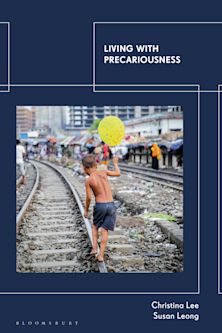- Home
- ACADEMIC
- Politics & International Relations
- Political Theory and Philosophy
- New Neoliberalism and the Other
New Neoliberalism and the Other
Biopower, Anthropophagy, and Living Money
New Neoliberalism and the Other
Biopower, Anthropophagy, and Living Money
You must sign in to add this item to your wishlist. Please sign in or create an account
Description
The exhaustion of neoliberal globalization is marked by three great tendencies or inflections: the first is the scornful failure of the South-American attempt to construct a neo-developmentalist exit; the second is the increasingly unavoidable Chinese-effect macro and micro dynamics within globalization; the third is the combination of austerity policies and monetary emissions (Quantitative Easing) that characterize, for instance, the financial conduct of the Central European Bank. The dramatic failure to renew traditional state interventionism in the sphere of Pink Tide in Latin American politics—in particular with the violent recession of the biggest economy on the Latin American continent, Brazil—shows and confirms that the escape from neoliberal regulation does not pass through the return of the traditional role of the state. At the same time, the Chinese economy came to play a double role. On one hand, it appears to represent the great and irreversible novelty of neoliberal globalization, particularly when our point of perspective is South America. While almost nothing remains of the legacy of the center-left-leaning regimes, the last South American decade appears to have genuinely been a Chinese decade. The Chinese advance is seen, especially by voices of the critical globalization studies, as a new “outside” of Empire, as something that stands for an alternative path, even if it is nothing more than an “old new” outside. Meanwhile, the role played by the financial sector continues to be regarded per se as the fundamental problem of contemporary capitalism. For some, this is a case of a deviation from an otherwise “good capitalism, the misleading result of a fictitious and unreal sphere (as opposed to the sphere of material economy, of good old bosses and hard workers), while for others, it is a case of one of the moral characteristics of Western civilization: infinite debt, and capitalism happens to be its modern drift.
Table of Contents
Chapter 6: Anthropological Radicalism of Contemporary Capitalism
Conclusions: The Body of the Poor
Bibliography
About the Authors
Product details
| Published | Feb 19 2018 |
|---|---|
| Format | Ebook (Epub & Mobi) |
| Edition | 1st |
| Extent | 254 |
| ISBN | 9781498526678 |
| Imprint | Lexington Books |
| Publisher | Bloomsbury Publishing |
About the contributors
Reviews
-
What if Brazil, or more generally the South, could be taken seriously in re-conceptualizing global neoliberalism—its domination and resistances? In their brilliant and thought-provoking book, Cocco and Cava offer a strong theoretical and political framework to move beyond multicultural and dialectical traps by convincingly arguing for the centrality of subjectivities and the body as the exit from biopower.
Óscar Garcia Agustin, Aalborg University
-
An amazing, brilliant, provocative and landmark book. It embraces the historical capitalism, issues on development, domination in the South, finance, the nature of value, biopower, acculturation, postcolonial. It is a book of philosophy, political economy, contemporary history and politics, sociology and anthropology. A truly transdisciplinary essay, a world book offering the kind of knowledge we need to face the political challenge of an everlasting and reborn capitalism. The authors have followed Foucault’s last seminar on neo and ordo liberalism of 1978-1979. You want to know more about neoliberalism, money, the failure of the Left in Brazil, marginalism, the Anthropophagic Manifesto? Read this book.
Yann Moulier Boutang, Université de Technologie de Compiègne



































